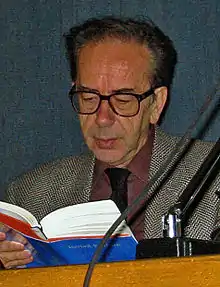Académie des Sciences Morales et Politiques
The Académie des Sciences Morales et Politiques (French pronunciation: [akademi de sjɑ̃s mɔʁal e pɔlitik], Academy of Moral and Political Sciences) is a French learned society. It is one of the five academies of the Institut de France.

Organisation
The members of the Académie are elected by peers. It is made of 50 members in 6 different sections depending on their specialisations:
- I : Philosophy
- II : Morals and Sociology
- III : Law
- IV : Political economics, statistics and finances
- V : History and geography
- VI : General section, formerly called « membres libres » (free members)
History
The Académie was founded in 1795, suppressed in 1803, and reestablished in 1832 through the appeal of Guizot to King Louis Philippe.[1] It is divided into five sections and has for its chief purpose the discussion of mental philosophy, law and jurisprudence, political economy and statistics, general and philosophical history, and politics, administration, and finance. It distributes the Baujour, Faucher, Bonnefous, Halphen, Bordin, and other prizes, publishes Mémoires, and holds its annual meeting each December.
Role and missions
Being under the protection of the president of the Republic, the Academy, a distinctive legal entity with particular status, promotes regular meetings and debates devoted towards fundamental or unanswered topics. In the last years, some of the themes were:
List of current members
- Gérald Antoine
- Jean Bæchler
- Marianne Bastid-Bruguière
- Pierre Bauchet
- Alain Besançon
- Marcel Boiteux
- Jacques Boré
- Bernard Bourgeois
- Gabriel de Broglie
- Jean-Claude Casanova
- Chantal Delsol
- Renaud Denoix de Saint Marc
- François d'Orcival
- Roland Drago
- Jacques Dupâquier
- Yvon Gattaz
- Shlomo ha-Levi
- Lucien Israël
- Jacques de Larosière
- Emmanuel Le Roy Ladurie
- Jean Mesnard
- Thierry de Montbrial
- Alain Plantey
- Bertrand Saint-Sernin
- Pierre Tabatoni
- François Terré
- Claudine Tiercelin
- Jean Tulard
